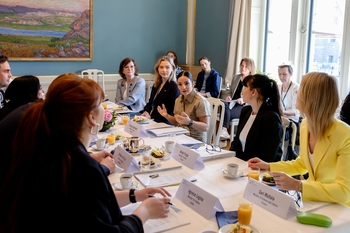Nordic climate and environment ministers meet with UNEP Executive Director

The Nordic Council of Ministers for the Environment and Climate (MR-MK) held one of its biannual meetings in Stockholm on Wednesday, 8 May. The agenda included an in-depth consultation with Inger Andersen, the Executive Director of the United Nations Environment Programme (UNEP). Their talks focused on the environmental dimension of sustainable development and the need for circular material consumption in the Nordic Region and the rest of the world.
The Executive Director of the United Nations Environment Programme (UNEP). Inger Andersen: "Nordic countries are important partners in our efforts to address the triple planetary crisis: the crisis of climate change, the crisis of nature and biodiversity loss, and the crisis of pollution and waste. Meetings like this underscore why environmental multilateralism is vital to accelerate the progress we need. Which is why I’m deeply encouraged by the support from Nordic Ministers for strengthening the role of the UN Environment Assembly - the world’s highest-level decision-making body on the environment hosted by UNEP. The Assembly fosters effective, inclusive and multilateral progress, and I look forward to working with Nordic countries to accelerate action to tackle the triple planetary crisis.”
Swedish Minister for Climate and Environment Romina Pourmokhtari: "The Nordic countries emphasise the importance of working with UNEP on higher global ambitions for the circular economy. Involving the business community is an important part of the work on this. The Nordic countries also have plenty of opportunities to contribute solutions in areas such as construction and textiles."
The Secretary General of the Nordic Council of Ministers, Karen Ellemann: “Our very high resource consumption in the Nordic Region also means that we have a great responsibility, so I’m very pleased with today’s positive discussions with UNEP on what the Nordic countries can do to improve global work on the environment and climate – especially on circularity." We have the know-how, and we agree on the direction and end goal, which is the key to success.”
The ministers and the Executive Director also discussed what contribution the Nordic countries can make to raising the level of ambition at future sessions of the UN Environmental Assembly (UNEA) and making sure they have a strong strategic focus. The ministers signed a joint statement based on the consultation.
Meetings like this underscore why environmental multilateralism is vital to accelerate the progress we need. Which is why I’m deeply encouraged by the support from Nordic ministers for strengthening the role of the UN Environment Assembly
Global climate and environmental negotiations in focus
The ministers also discussed the ongoing negotiations on a global UN agreement to put a stop to the massive problems caused by plastic pollution, the upcoming biodiversity COP (COP16) and the joint Nordic focus on the climate COP (COP29). Executive Director Inger Andersen joined in these discussions.
The Nordic Region has conducted several analyses as part of the ongoing global plastics negotiations, and the ministers discussed how their countries can work together at a strategic level to reach an ambitious and binding global agreement at the negotiations (INC5) this autumn.
Swedish Minister for Climate and Environment Romina Pourmokhtari: "We see great opportunities for the Nordic countries to make a contribution to an ambitious agreement by continuing to push for an agreement that covers the whole life cycle of plastics, including primary production. This work is particularly important because major producing countries want to avoid it being included in the agreement. The Nordic countries can offer a wealth of experience in plastics management throughout the value chain."
Facts
UNEP sets the UN's global environmental agenda and negotiates global agreements in areas that ensure environmentally sustainable development worldwide. The Nordic countries support UNEP individually and through the work of the Nordic Council of Ministers.




